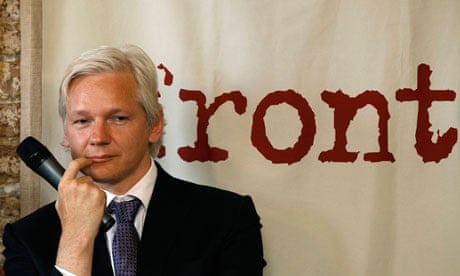I joined WikiLeaks last November as a staffer for a three-month stint. Culture shock came just a few days in, when Julian Assange gathered core staff and supporters at Ellingham Hall, a manor house owned by the Frontline Club founder and WikiLeaks supporter Vaughan Smith.
Around the dining table the team sketched out a plan for the coming months, to release the leaked US diplomatic cables selectively for maximum impact. Phase one would involve publishing selected – and carefully redacted – high-profile cables through the Guardian, New York Times, Der Spiegel, Le Monde and El Pais. Phase two would spread this out to more media organisations.
But clearly a large volume of cables would remain, of little interest to any media organisation. Several at the meeting – myself included – stressed these documents, which would probably number hundreds of thousands, could not be published without similar careful redaction. Others vehemently disagreed.
Johannes Wahlström, Swedish journalist and son of antisemitic WikiLeaks activist Israel Shamir, shouted: "You do realise the idea of not putting ALL of these cables up is totally unacceptable to people around this table, don't you?"
Julian took Wahlström's their side. One way or another, he said, all the cables must eventually be made public.
There were further disillusioning incidents. During December 2010, a period where WikiLeaks was struggling to muster even a $10,000 donation to the defence fund of Bradley Manning, the US soldier alleged to have leaked the cables, Assange nevertheless privately promised several thousand Australian dollars to fund Juice News, the makers of humorous pro-WikiLeaks YouTube videos.
Julian's arrest loomed, on allegations of sexual assault. Aware he would need money to post surety, he scrabbled for sources of cash. He attempted to access WikiLeaks funds, received through donations.
He approached the Wau Holland Foundation, which manages the bulk of WikiLeaks' finances, to ask for substantial funds – for "the future of WikiLeaks". Quite properly, it refused, as Julian's personal legal action was not one of the stated purposes of the donations.
Assange also tried to obtain the cash held by WikiLeaks' Icelandic division, asking the directors to sign a form authorising the transfer of their (much smaller) coffers.
When I asked one of them whether such a transfer was legal, he replied "I have no idea" – but signed anyway.
In the event, Julian mustered funds from celebrity backers. But trying to use WikiLeaks' precarious resources to fight a personal legal action was, to my view, morally indefensible.
WikiLeaks is not a conventional organisation. It has no board, no governance, and no effective rules. In such a febrile environment, and with Julian so central to the organisation's ability to function, it's not hard to see how such decisions came to be seen as correct.
So I decided to grit my teeth and carry on. Dismay mounted, however, with the arrival of Israel Shamir, a self-styled Russian "peace campaigner" with a long history of antisemitic writing. Shamir was introduced to the team under the pseudonym Adam, and it was only several weeks after he had left – with a huge cache of unredacted cables – that most of us started to find out who he was.
Press enquiries started to trickle in. A little research revealed his unsavoury history, but I was told Julian would be unwilling for WikiLeaks to publish anything critical of Shamir. Instead, shamefully, we put out a statement simply distancing WikiLeaks from him.
There followed even more damning allegations. Shamir had been seen leaving the interior ministry of Belarus, an eastern European dictatorship.
The next day, the country's dictator, Alexander Lukashenko, boasted he would start a Belarusian WikiLeaks showing the US was funding his political rivals.
Scores of arrests of opposition activists followed the country's elections – but Shamir wrote a piece painting an idyllic picture of free, fair, elections in a happy country.
Human rights groups demanded answers, amid fears that Belarus may have received material from the cables. No answers were supplied. Julian would not look into the matter.
For an organisation supposedly devoted to human rights, the apparent lack of concern when faced with such a grave charge was overwhelming.
My trips to WikiLeaks' HQ became far less frequent, and I attempted to leave the organisation early. This was refused. I was cornered for several days and asked to sign a gagging agreement.
Supporters were asked to "apply psychological pressure" to encourage me to sign, evidencing a growing cultlike ethos at the centre of the group.
I was disturbed and conflicted. I still found the organisation's aims were in many ways laudable, the financial and legal pressures unjust, and its publishing pattern far more responsible than it received credit for.
I couldn't support its internal culture, its lack of accountability, willingness to lie publicly, and crucially its failure to condemn Shamir. I supported the organisation's principles, but not its methods.
The final straw for me came on Friday. By drawing attention to, and then publishing in full, the unredacted cache of documents, WikiLeaks has done the cause of internet freedom – and of whistleblowers – more harm than US government crackdowns ever could.
Before the first publication of carefully redacted cables, human rights activists, NGOs, and organisations working with victims of horrific crimes contacted WikiLeaks begging us to take steps not to publish any names. To be able to assure them details would be protected was an immeasurable relief.
These cables contain details of activists, opposition politicians, bloggers in autocratic regimes and their real identities, victims of crime and political coercion, and others driven by conscience to speak to the US government. They should never have had to fear being exposed by a self-proclaimed human rights organisation.

